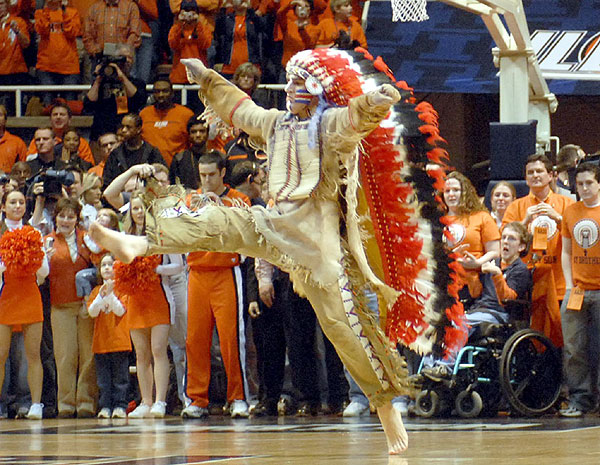04/08/2014 Christine Des Garennes
URBANA — A University of Illinois student group has organized a walk on the Quad tonight to show support for a Native American student who recently wrote about the anguish brought on by still seeing images of the retired, but not gone, Chief Illiniwek.
“Walk with Xochitl” is scheduled for 6 to 7 tonight on the UI Quad.
The student wrote the open letter to Chancellor Phyllis Wise, the Board of Trustees and other campus administrators, posted it on social media sites but declined to be interviewed by The News-Gazette. Members of the Native American Indigenous Student Organization, which organized tonight’s event, also declined comment. The event is being advertised as a walk “in solidarity for a better campus climate.”

11/11/2007
University of Illinois mascot Chief Illiniwek made his final appearance for the school, performing during the Illini-Michigan basketball game in Champaign. Chief Illiniwek’s career ended after 81 years because of pressure from the NCAA, which considers the mascot offensive to American Indians.
In the letter posted last week, the senior student writes about “the legacy of disrespect and racism” she has experienced at the UI and the “emotional, physical and spiritual pain that seeing the former-yet-still-lingering Chief mascot has on me.”
“As an indigenous student, this image and every likeness to it represented a complete disregard for American Indian culture and spiritual practices, and that every time I saw it, it was not only an emotional stab, but also an impediment to my academic success,” she wrote.
She called on the chancellor to prohibit students from wearing Chief Illiniwek apparel and other accessories.
The student says she will leave the UI feeling disappointed with the chancellor; trustees; Office of the Dean of Students; Office of Diversity, Equity, and Access; and College of Liberal Arts and Sciences.
The student also describes how she contemplated committing suicide on the Quad, writing: “This whole Chief situation was so unbearable, and the apathy on behalf of administration so painful, that it was obvious that nothing was going to change.”
UI Deputy Chief of Police Skip Frost said university officials and police learned about the letter last week.
“We are fully aware of it and have taken steps to make contact with (the student) and have different units of campus provide services to her,” Frost said.
Campus spokeswoman Robin Kaler said whenever the university learns of “students who face challenges that require intervention, we connect the student with assistance and we remain connected until we are confident the student’s well-being is restored,” she said.
“Race and ethnicity are complicated issues in our country, state and university. While no one measure can address the issue, we will continue to hold dialogues about race and cultural sensitivity,” Kaler added.
As they do for campus rallies and other events, university police planned to meet in advance with the walk’s organizers.
“We will be involved to make sure everybody has a chance to express their viewpoints,” Frost said.
The campus officially ended use of Chief Illiniwek as its official symbol or mascot in 2007, but some students still wear Chief apparel and an “unofficial” Chief often appears in costume at games and walks through the crowds, raising his hands.
Last year a new student group, Campus Spirit Revival, launched a competition to solicit ideas for a new mascot. But that prompted the formation of a new group, Stop Campus Spirit Revival, which was created to halt the original group’s action.
Also last year, a group of former Illiniwek portrayers asked trustees to bring back a non-dancing version of the Chief to halftime shows. Wise said the Chief is part of the school’s past, not its future.
